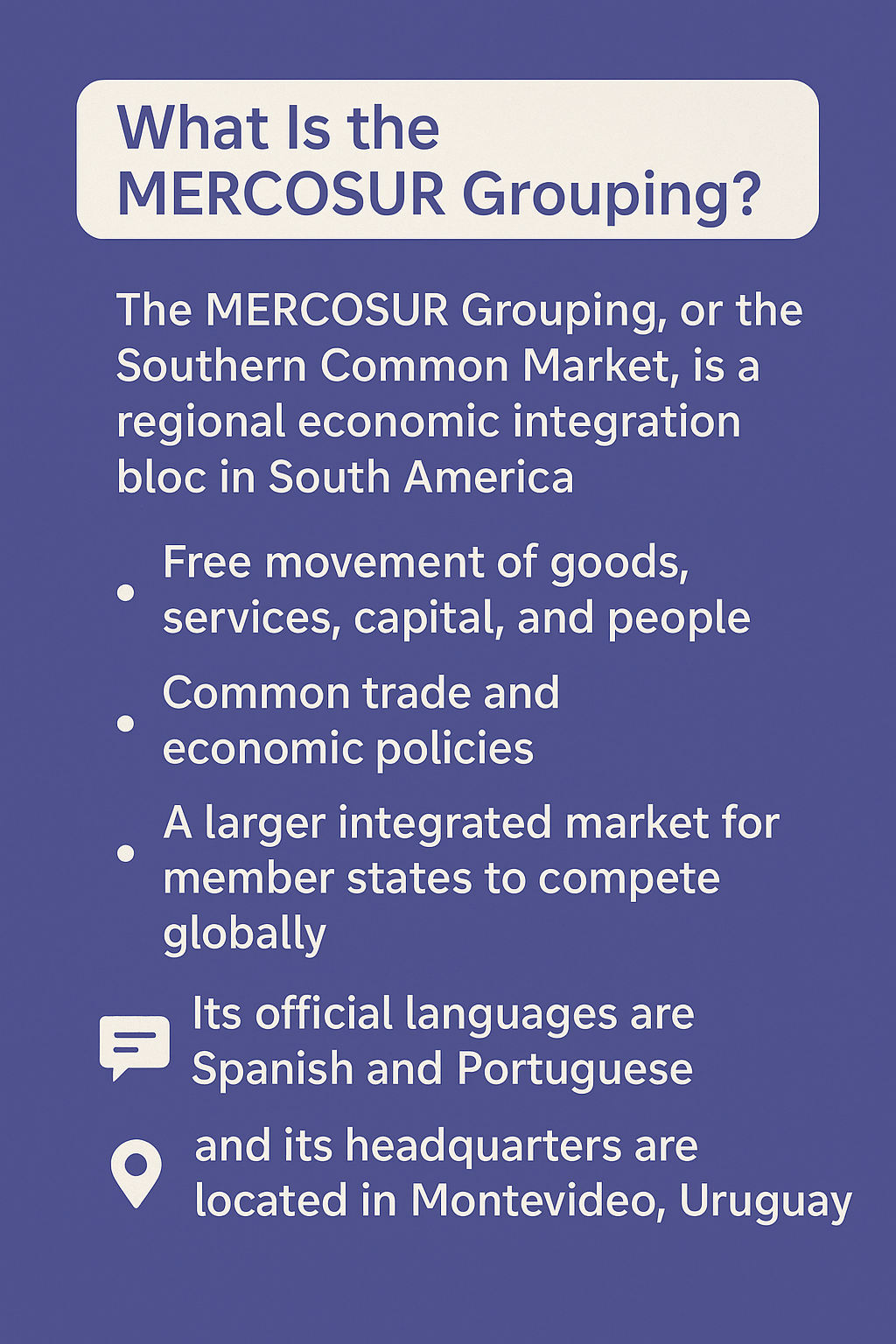In a significant diplomatic and economic development, India has expressed strong interest in expanding its trade ties with the MERCOSUR Group. During a recent high-level meeting with the President of Paraguay, India’s Prime Minister stated that both nations should work together to further broaden the Preferential Trade Agreement (PTA) with this influential South American bloc. This moment marks not just a diplomatic milestone but also a renewed global recognition of the MERCOSUR Grouping as a pivotal economic player.
MERCOSUR Grouping – Latest News
- During the Paraguay President’s recent visit to India, Prime Minister Narendra Modi proposed a deeper trade partnership between India and the MERCOSUR Group.
- India aims to expand the existing Preferential Trade Agreement (PTA) to include more products and greater tariff benefits.
- This renewed interest indicates India’s strategic outreach to Latin American markets and reflects MERCOSUR’s importance in the Global South’s economic realignment.
Historical Background of the MERCOSUR Grouping
To understand its current relevance, one must first explore how the MERCOSUR Grouping came into being.
- The MERCOSUR Grouping was established in 1991 through the Treaty of Asunción.
- It emerged in the post-Cold War world, where regional economic blocs were forming to enhance collective bargaining power in global trade.
- By 1995, the bloc had created a customs union, a common external tariff for imports from outside the group.
- Initially, MERCOSUR aimed to promote free trade, but over the years, it evolved into a political forum as well, allowing members to align on foreign policy and regional stability.
What Is the MERCOSUR Grouping?

The MERCOSUR Grouping, or the Southern Common Market, is a regional economic integration bloc in South America. It facilitates:
- Free movement of goods, services, capital, and people
- Common trade and economic policies
- A larger integrated market for member states to compete globally
Its official languages are Spanish and Portuguese, and its headquarters are located in Montevideo, Uruguay.
Full Form of MERCOSUR
- In Spanish: Mercado Común del Sur
- In English: Southern Common Market
The name reflects its purpose: uniting the Southern nations of the Americas under one economic umbrella.
Headquarters and Decision-Making
The MERCOSUR Grouping is headquartered in Montevideo, Uruguay, and it operates through structured governance:
- Its highest decision-making body is the Common Market Council.
- This council comprises foreign and economic ministers of member countries.
- Decisions are made by consensus, and the presidency rotates every six months among full members.
MERCOSUR Grouping – Full Members
The bloc began with four core countries:
- Argentina
- Brazil
- Paraguay
- Uruguay
Later additions include:
- Bolivia (recent full member)
- Venezuela (joined in 2012, suspended since Dec 1, 2016, due to political instability)
MERCOSUR Grouping – Associate Members
While not full members, these countries hold observer or associate status:
- Chile
- Colombia
- Ecuador
- Guyana
- Peru
- Suriname
These nations engage in limited trade agreements and cooperation, but do not participate in all decision-making processes.
India and MERCOSUR Grouping: A Growing Partnership
India has been actively engaging with the MERCOSUR Group for nearly two decades. Here’s how the partnership has evolved:
Preferential Trade Agreement (PTA) – 2004
- Signed in January 2004
- Came into force in June 2009
- India offered concessions on 450 products, and MERCOSUR offered similar benefits on 452 products
- Major sectors covered: pharmaceuticals, organic chemicals, engineering goods, textiles, auto parts, and agriculture
Strategic Importance for India
India sees the MERCOSUR Grouping as a gateway to:
- Latin American raw materials, such as lithium and rare earths
- Agro-industry products, crucial for food security
- Energy and mining cooperation, especially with Brazil and Argentina
What India Gains from MERCOSUR?
- Diversification of export markets
- Reduced dependency on Europe and the U.S.
- Boost for India’s Look South Policy
Recent Push for Expansion
- India’s Prime Minister recently urged deeper engagement with Paraguay, signaling a broader push to revise and expand the PTA.
- The effort is not just economic—it reflects India’s ambition to strengthen South-South Cooperation and align with Latin America geopolitically.
Global Significance of the MERCOSUR Grouping
The MERCOSUR Grouping isn’t just a regional trade pact. It plays a significant global role:
- It is the 4th largest trade bloc in the world, after the EU, NAFTA (now USMCA), and ASEAN.
- It represents over 60% of South America’s GDP.
- MERCOSUR acts as a unified voice for Latin America in international forums like the WTO and UN.
Conclusion
The MERCOSUR Grouping continues to evolve as a powerhouse in South American regional integration. With India seeking to enhance trade and diplomatic relations, this partnership holds immense promise for both sides. As global power centers shift and regional alliances gain traction, the time is right to watch how MERCOSUR reshapes the economic map of the Global South, with India as a committed stakeholder.
MERCOSUR Grouping – FAQs
Ans: The MERCOSUR Grouping is a South American economic organization aimed at enabling free trade, movement of capital, services, and people among member countries.
Ans: Argentina, Brazil, Paraguay, Uruguay, and Bolivia are full members. Venezuela is currently suspended.
Ans: Chile, Colombia, Ecuador, Guyana, Peru, and Suriname are associate members of the MERCOSUR Grouping.
Ans: The headquarters of the MERCOSUR Grouping is located in Montevideo, Uruguay.
Ans: India signed a Preferential Trade Agreement with MERCOSUR in 2004 and is currently exploring ways to expand it, as discussed with Paraguay in recent diplomatic talks.












